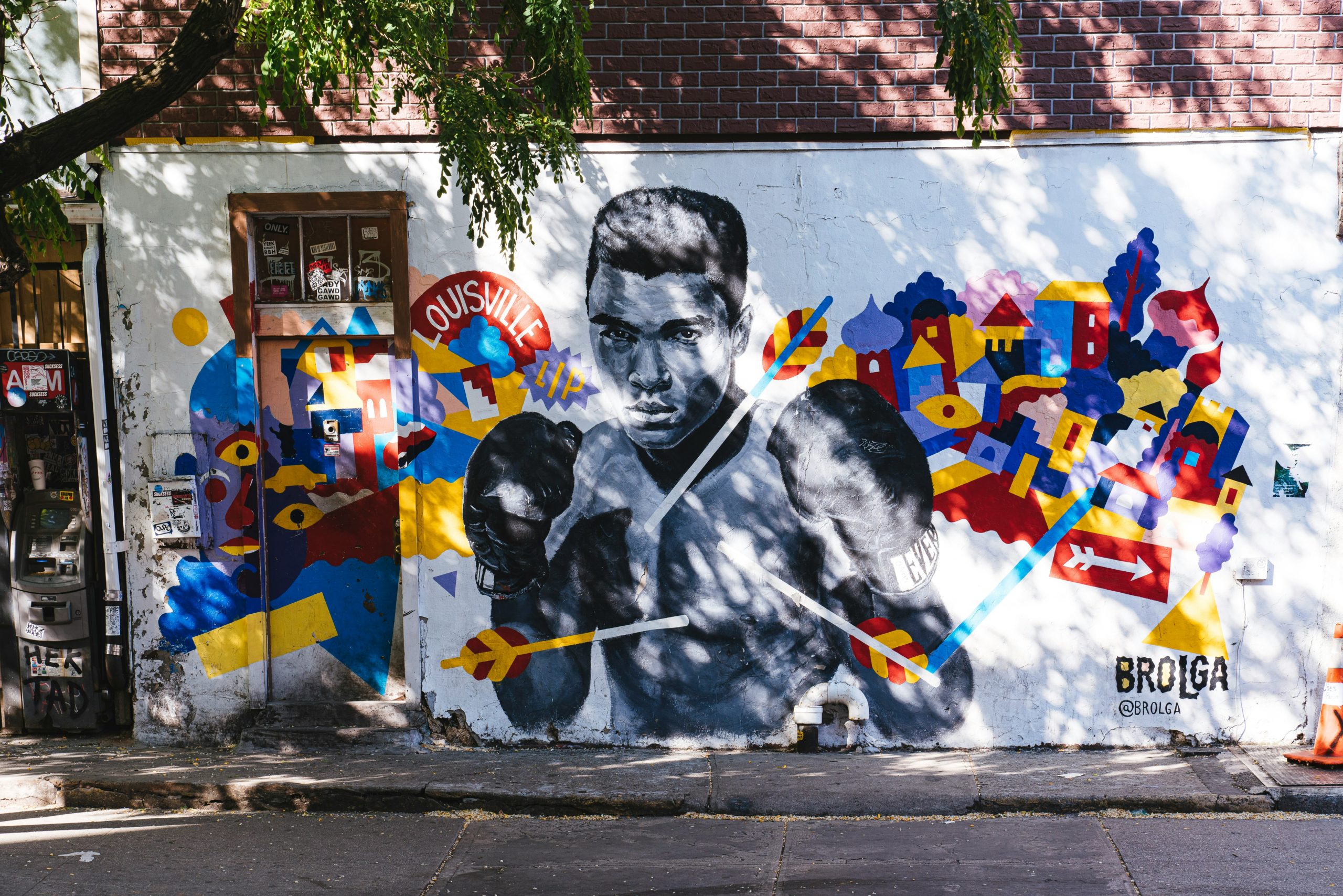Photo by Nelson Ndongala vis Unsplash
Muhammad Ali stood for something bigger than himself. His dedication to boxing and social activism glows as something we can all strive for.
Ali grew up in Louisville, Kentucky, directly in the American South. He was originally named after his father, Cassius Marcellus Clay Sr. He changed his name to Muhammad Ali following his win over Sonny Liston in 1965. The People’s Champion, as he was nicknamed, was a strong advocate for African American rights, as well as a devout Muslim. He is the undisputed champion to all striving to accomplish something greater than themselves.
Muhammad Ali started boxing at age 12. He lived with his mother, father, and his brother. His father painted billboards to put food on the table. Joe Martin, a Louisville policeman, took Ali under his wing after discovering him. At the age of 18, Ali stunned the world with a gold medal win at the 1960 Olympic games in Rome.
Ali would become known for his personality along with his in-ring ability. By the end of 1963, Ali amassed a record of 19-0 with 15 wins by knockout. Ali was knocked down twice, first by Sonny Banks and then by Henry Cooper. Both times he got back up and beat his opponent.
Ali’s career hit new heights after his fight with Doug Jones. The fight took place at Madison Square Garden in New York City. This was Jones’s home city and he was greatly anticipated to win. Ali won in MSG by unanimous decision.
Following the fight, fellow boxer Sonny Liston quipped to the media that he would get locked up if he faced Ali. The two could not be more different. Liston was a boxing legend at this time, who had learned how to box in the Missouri State Penitentiary while serving time for armed robbery. Liston was the victim of racist attacks throughout his career. James Baldwin once remarked that Liston “had never gotten a break and was never going to get one.”
Ali, on the other hand, was 22 years old and already an Olympic champion. Ali had also developed his trash-talking ability. He called Liston a “big ugly bear” and added that “Liston even smells like a bear.” Ali’s pulse rate at weigh-in was measured at 120; twice his normal heart rate of 54. Nevertheless, Ali entered the weigh-in screaming, “Someone is going to die at ringside tonight” to mock Liston’s earlier comments about killing him. Some commentators wondered if Ali would show up to the fight at all.
Liston rushed Ali upon the crack of the opening bell. Ali avoided him due to his superior speed. Ali hit Liston at the end of the first round, cutting his eye open. This was the first time Liston had ever been cut open by another fighter.
Ali complained of burning in his eyes which has been suspected to have come from an illegal substance on Liston’s gloves. In the sixth round, when the substance had washed out of Ali’s eyes, he was able to land blow after blow. Liston went down in the seventh round, and Ali was declared the Winner by TKO. Ali’s following words echo in history:“Eat your words, I am the greatest! I Shook up the world. I’m the prettiest thing that ever lived.”
Ali became the youngest fighter to defeat a defending champion, and in the process he became the world heavyweight champion.
Following the fight, Ali changed his name to Muhammad Ali. This was a spiritual transformation. He disregarded his old name as a “slave name” which was directly involved in the Trans-Atlantic Slave Trade. Ali would first change his name to Cassius X, inspired by Malcolm X, whom he knew. Ali converted to Islam and took the name of Muhammad Ali, which means Supremely Praiseworthy.
Ali successfully defended his title against Floyd Patterson in a fight that raged for 12 rounds. Patterson refused to call Ali by his chosen name.
In 1966 Ali declared that he would not serve in Vietnam. The Louisville draft board conscripted Ali, which would make his service inevitable unless he refused to do so. Following his refusal to serve, the Illinois Athletic Commission refused to sanction his next fight, which was scheduled to be on March 29th, 1966, against Ernie Terell.
Ali stated in his defense that he would refuse service due to religious reasons. Due to the Qur’an’s insistence that no war is declared unless by Allah or The Messenger. Ali also called out the racism rampant in the United States. Questioning if fighting a war in Asia was what was in the American people’s best interests, but also the world.
Ali did show up for his scheduled induction into the United States Armed Forces. However, he refused to step forward when the officer called his name. Ali was then arrested, which prompted the New York State Athletic Commission to suspend his boxing license. The World Boxing Association would also strip Ali of his title.
Ali, Jim Brown, Bill Russel, Carl Stokes, and Kareem Abdul-Jabbar met at The Cleveland Summit. The men came out of that meeting in support of Ali and his fight against conscription and injustice.
Ali was found guilty after only 21 minutes. Ali appealed the case to the Supreme Court and was allowed to walk freely until the Supreme Court could see the case in 1971.
Ali became politically active during his exile from boxing. He was vocal in his continued opposition to the Vietnam War. Ali was treated with incredible harshness by the American media. Despite this, Ali’s popularity continued to rise.
Ali was a part of an early computer-programmed fight. Ali and Rocky Marciano staged a fantasy fight to be shot and released to the public in theaters. Ali and Marciano at that time were the only undefeated heavyweight champions. Ali and Marciano sparred for 75-minute rounds. A computer then picked the winner based on data as well as the opinions of 250 experts. Ali would lose the fantasy fight in the 13th round in the American edition but won in the European edition of the film.
Ali made his return in August 1970. The City of Atlanta Athletic Commission granted Ali a license. He was aided by Leroy Johnson and Jesse Hill Jr. Ali’s first fight back would be against Jerry Quarry, which ended in a third-round win. In the follow-up to the fight, the New York Boxing Commission decided to follow Atlanta’s lead and reinstate Ali’s license. This would result in a fight against Oscar Bonavena at MSG. Upon Ali’s win, he was slated to fight the current heavyweight champion, Joe Frazier.
Frazier vs. Ali had tremendous hype leading up to it. It was promoted as the fight of the century. Many tuned in to see if Ali could regain his heavyweight championship, which was stripped following his refusal to be drafted. Both Frazier and Ali were undefeated at this point. Ali had 25 KOs with a record of 31-0. Frazier had 23 KOs with a record of 26-0. Unlike Ali, Frazier supported U.S. involvement in Vietnam, which pushed Ali to become a symbol for the anti-establishment public.
The night of the fight, New York City was a circus. Policemen patrolled outside Madison Square Garden. People watch from across the world. Frank Sinatra took photographs that would be published in Life Magazine. Woody Allen waited outside, unable to secure a ticket. A young Nelson Mandela watched, sitting in prison. The whole world was watching.
Ali would dominate the first five rounds, however, it would not last. After the sixth, Ali was visibly tired. In round eight, Fraizer was able to hit Ali with a clean left hook to his right jaw. In the ninth round, Fraizer caught Ali again. Ali fell to the ground, but he managed to get back up. Ali would get hit with another left hook before the round was over.
Frazier scored in the lead heading into the 15th round. (7-6-1), (10-4-0), (8-6-0). Ali got hit with another left hook in the 15th. Ali’s jaw was noticeably swollen. He stayed on his feet for the remainder of the match. The judges scored the win for Frazier. This would mark Ali’s first professional defeat. Frasier would lose his title when he was knocked out by George Foreman 22 months later.
Following the match, Wilt Chamberlain, an NBA Basketball star, challenged Ali to a match. After Ali taunted the star with comments like “timber” and “the tree will fall,” Chamberlain decided to abandon the match. To replace Chamberlain, Ali got his childhood friend and former sparring partner, Jimmy Ellis, to fight. Ali would win in the twelfth round.
Ali now had to define himself past being undefeated. He did lose a match, but that did not mean he had to stay a loser forever. He picked himself up and kept fighting.
Ali won six fights in 1972. In 1973, Ken Norton broke Ali’s jaw and gave him the second loss of his career. Although he considered retirement, Ali won his second bout against Norton. He was then destined to face Frazier once more in Muhammad Ali vs. Joe Frazier II.
The fight took place at Madison Square Garden. Fraizer was caught off guard by Ali’s aggressive style and never caught up. Ali was able to successfully stay away from Fraizer’s left hook and punish him for all 12 rounds. Ali won in a unanimous decision.
George Foreman was the biggest name in boxing at this time. He held the undisputed heavyweight championship. Ali, through his recent victories, earned the right to fight for the title. Foremen would defend his title in a fight remembered by the name “The Rumble in the Jungle.” This fight took place in Kinshasa, in the now Democratic Republic of the Congo, formerly Zaire.
Over 50 million tuned in on pay-per-view to see one of the highest anticipated boxing fights of all time.
Many thought Foreman would be the ultimate wall Ali would face. Foreman’s punch was one of the hardest in heavyweight history. No one thought Ali could beat Foremen except for Ali himself. Ali told David Frost, “If you think the world was surprised when Nixon resigned, wait until I whip Foreman’s behind!” Ali’s popularity in Zaire soured with him making more quips such as “I’m so mean I make medicine sick.”
The fight happened on October 30th, 1974. Ali opened the fight with right crosses in an attempt to disorient Foreman. This was a dangerous tactic, as Foreman’s greatest strength was his close-range haymakers. Despite this, Ali continued his aggressive tactic. At the end of the first round, Ali realized that he could try and get Foreman to tire himself out.
Ali debated his rope-a-dope tactic by leaving him on the ropes and letting Foreman punch his arms. This allowed Foreman to spend extensive energy on ineffective hits. Ali would take every opportunity that opened to him to hit Forman in the face. Ali constantly put his entire weight on Foreman when they were locked in clinches. Ali continued to taunt Foreman during these cliches, encouraging him to throw more punches.
Foreman became tired after Ali continued these strategies for several rounds. His face was increasingly damaged while Ali was still in good shape. An iconic moment was when Foreman punched Ali straight in the jaw and Ali responded, “Is that all you got George?”
In the Eighth round, Ali punched and landed several right hooks. A hard right straight caused Foreman to drop to the canvas. Although Foreman attempted to rise, referee Zack Clayton called off the fight. Ali led on all scorecards at the end of the fight, which was the most watched with a record estimated audience of 1 billion.
One of Ali’s next fights against Chuck Wepner would inspire Sylvester Stallone to create Rocky when Wepnet stunned Ali with a knockdown in the ninth round.
Ali embarked on a third match with Joe Frazier in 1975 in Manila. Frazier had the upper hand in the first few rounds, however, due to Alii’s ability to take punches, he survived until the 12th round when Frazier started to tire. One of the blows that Ali landed cut Frazier’s left eye open. Ali dominated the 13th and 14th rounds. Frazier’s trainer Eddie Futch stopped the fight in the 15th round due to both of Frazier’s eyes being swollen shut. Ali considered retirement after this match due to the incredible punishment he had taken so far in his career.
Ali would decide to not retire fighting several times in 1976. The fight against Richard Dunn on May 24, 1976, would prove to be the last time Ali knocked out his opponent.
Ali tried to retire several times in the next years but always came back to the world of boxing. Ali’s longtime doctor quit after Ali refused to take his advice to retire. Ali lost his WBC heavyweight championship in 1978 in a fight against Leon Spinks. Ali won the rematch in Louisiana in front of 70,000 people. Ali became the first Heavyweight champion to win the belt on three separate occasions.
On July 27th, 1979, Ali announced his retirement. This would be short-lived, as he wanted to win the belt an unprecedented 4th time. Larry Holmes did not want to fight Ali, as he worried about the state of Ali’s health. Future signs of his Parkinson’s disease had started to become visible, with trembling hands and his struggle with his vocal cords.
Ali was fought next in Caesar’s Palace in Las Vegas, where he lost the fight by stoppage in the tenth round. Ali fought one more time in Nassau, Bahamas, against Trevor Berbick and lost a ten-round decision.
Ali also fought an exhibition match against NHL player Dave Semenko on June 12th, 1983, which ended in a draw.
In 1984, Ali was diagnosed with Parkinson’s Syndrome, but this did not stop him from continuing to make public appearances. He served as a guest referee in the first Wrestlemania and lit the Olympic Torch in the 1996 Atlanta Olympics.
Ali’s humanitarian work should not be forgotten when looking through his incredible boxing career. Ali donated millions to charity organizations and reached out to disadvantaged people of all religious backgrounds.
One of his biggest focuses’ was on youth education, where he donated to the United Negro College Fund. Ali visited Africa extensively, including a Palestinian refugee camp in Southern Lebanon. He also participated in the Longest Walk in support of the rights of Native Americans. He joined President Jimmy Carter on a diplomatic mission to Africa to persuade African governments to join the boycott of the Moscow Olympics due to the Soviet Union’s invasion of Afghanistan. Ali later supported the reelection of Ronald Reagan in 1984.
Ali’s Parkinson’s disease would eventually lead to a decline in his health and reduced public appearances. He worked alongside Micheal J. Fox to raise awareness and fund research. They both made a joint appearance in front of Congress in 2002. Ali’s work engorged thousands to donate to the Micheal J. Fox Foundation for Parkinson’s Research.
Ali was hospitalized in Scottsdale, Arizona, on June 2nd, 2016, where he passed away at age 74.
Ali was mourned by the world. Stations such as ESPN played nothing but coverage of Ali for hours.
Leaders such as President Barack Obama, Prime Minister David Cameron, Micheal Jordan, and Floyd Mayweather all made statements in his memory. The UFC mounted him in a lengthy video tribute during UFC 199.
Ali is recognized as the greatest boxer who ever lived. He was an inspiration to many to strive for something greater than themselves. He was a symbol of hope and perseverance which should never be forgotten.
Ali will be honored in a musical named Ali which will debut at The Kentucky Center in his hometown of Louisville, and then move on to Broadway in 2025.
Muhammad Ali was awarded the Presidential Medal of Freedom in 2005 for his dedication to humanitarianism, boxing, and human rights. He will never be forgotten.





